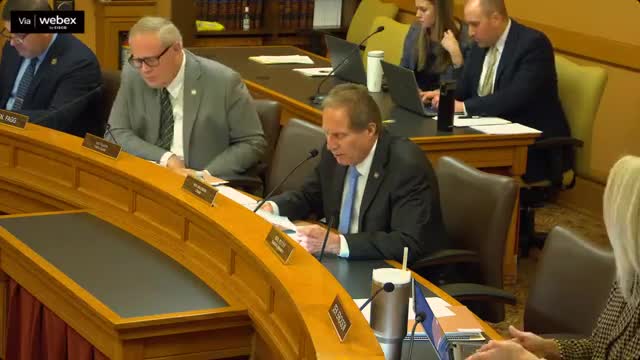Committee hears support for Heartland Flyer extension; bill would create passenger rail revolving fund
Get AI-powered insights, summaries, and transcripts
Subscribe
Summary
Senate Bill 86 would require the secretary of transportation to establish an intercity passenger rail service program and transfer annual funds into a passenger rail revolving fund to support an extension of the Heartland Flyer, proponents told the Kansas Senate Ways and Means Committee.
Senate Bill 86 would require the secretary of transportation to establish an intercity passenger rail service program and transfer funds to a passenger rail service revolving fund to support construction and operations, lawmakers heard at a Kansas Senate Ways and Means Committee hearing. David, from the Office of the Revisor of Statutes, told the committee the bill would direct the secretary, beginning July 1, 2026, each July through July 1, 2029, to certify amounts of unencumbered monies from the state general fund, the state highway fund or special revenue funds and transfer an aggregate $5,000,000 in each of those fiscal years into the revolving fund.
The bill matters, supporters said, because a connected passenger rail corridor could generate new economic activity for cities along the route, improve access for rural communities, and help Kansas compete for federal funding through Federal Railroad Administration (FRA) programs. Proponents urged the committee to approve the statutory framework so Kansas can remain competitive in the federal project pipeline.
David (Office of the Revisor of Statutes) summarized the bill’s mechanics: the secretary of transportation would implement and administer an intercity passenger rail program, provide funding for qualifying capital projects and offer operating support for Amtrak or other FRA‑approved common carriers. The bill specifies annual transfers of $5,000,000 into the passenger rail service revolving fund for each listed fiscal year beginning FY2027.
Deborah Fisher Stout of the Northern Flyer Alliance testified in strong support and expanded on written testimony. She said the Heartland Flyer Extension would help Kansas recruit students to state universities and produce broader economic benefits. “I urge the honorable members of this committee to support Senate Bill 86 and pave the way for a brighter future for Kansas,” she said. Fisher Stout cited a Missouri economic impact study that the witness said showed the Missouri River Runner generated hundreds of millions in economic activity and more in tax revenues than the state paid to operate the train.
Corey Davis, director of multimodal transportation and innovation for the Kansas Department of Transportation (KDOT), said KDOT “is committed to the expansion of passenger rail services in Kansas.” He told the committee KDOT has advanced a service development plan for the Heartland Flyer Extension, has completed step one of the FRA corridor ID program, and received $500,000 from the FRA to support planning. Davis said the service development plan covers operational analysis, capital needs, financial analysis and an implementation plan and that KDOT will continue to work with FRA and Amtrak on environmental review, engineering and funding strategies.
Zach Pistora, director of the Kansas chapter of the Sierra Club, urged support on environmental grounds, citing Department of Energy and Amtrak sustainability comparisons that his testimony summarized as rail being substantially more energy efficient and producing fewer emissions per passenger than air or car travel.
Local officials told the committee how a stop could affect their communities. Randy Frazier, city manager of Arkansas City, said a station stop could support tourism tied to a local archaeological site and benefit international students and businesses. Mike Stevens, a Leavenworth County commissioner speaking as an individual, said the extension would restore connections last provided by Amtrak prior to 1979 and argued that other states’ studies show sizeable job and tax revenue benefits.
Union representative Ty Drago, director and chairman of SMART (representing active and retired railroad employees), emphasized operational readiness and jobs. “The system is already built,” he said, adding that the line is prepared for positive train control and that passenger service would create direct railroad jobs and additional local employment.
Mark Horston, board member of the Northern Flyer Alliance, summarized the bill’s fiscal intent and federal context: passage would keep Kansas and Oklahoma competitive for an FRA grant package proponents described as enabling large infrastructure investment. Horston said the bill’s fiscal note contemplates annual transfers to the revolving fund to help cover future operational needs when service begins.
Committee members asked several operational and fiscal questions. Senator Owens asked about the value of an early‑morning transfer at Newton — where trains currently arrive around 2 a.m. — and proponents replied that Newton is the state’s highest boarding Amtrak station, that connections through Newton enable multi‑day travel patterns, and that additional frequencies and different schedules could be pursued after initial service is established. Proponents also said the FRA corridor ID program provides steep federal financial support early in operations (witnesses described a federal step‑down where initial years receive large federal shares, stepped down over several years) and that KDOT and Amtrak plan to apply for FRA planning and construction awards that could subsidize environmental review, engineering and infrastructure improvements.
Witnesses provided preliminary operational and ridership figures cited to the committee: an initial ridership increase of roughly 33,000 riders in early planning estimates and an estimated state operational support on the order of the mid‑millions per year (witnesses cited figures in the neighborhood of $3.4 million annually as the state’s share after federal step‑down). Proponents also referenced economic impact studies from Missouri and other states as examples of local benefits, and several cities told the committee they are prepared to invest locally in station rehabilitation.
No opponents or neutral witnesses appeared at the hearing. The committee closed the hearing on Senate Bill 86 with no immediate committee action recorded.
Looking ahead, proponents said passage of the statutory funding mechanism would strengthen Kansas’s position for FRA grants and make operational planning and federal applications more competitive. Committee members indicated follow‑up questions and additional briefings could occur at later meetings.
